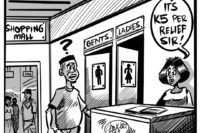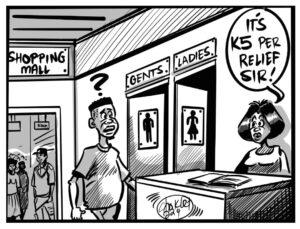Unfortunately, we have to continue talking about Zesco because currently, they are the most painful thorn in everyone’s behind right now. And Bembas tell us that apamfwa insofu, ilyashi libapo lyansomfu; translated to mean when an elephant dies, all talk in the village is centered around the dead elephant.
Two days ago, some Zesco managers were on Hot FM Radio explaining that the power utility had just concluded a pilot project that would help consumers to conserve electricity. They said Zesco would soon start installing new smart metre boxes that would regulate the usage of power in households. Our understanding was that Zesco would supply electricity to consumers but load shedding would be determined by the usage or abuse of individual households.
“In this regard, we will engage in what is called load limiting. For instance, maybe you draw 30 amps, maybe we’ll limit you to 10 amps so that you do not go off so that the power in terms of limiting usage comes to you but if you exceed consumption beyond the 10 amps, then you will load shed yourself,” said Zesco director for distribution Jonah Sichalwe.
We thought “what a brilliant idea!” Indeed, a lot of people would be happy to have electricity for lighting, maybe watching television and storing food in the fridge. Different houses and businesses use electricity differently. So if consumers would be given the power to decide their own load shedding, that would be a fair move under the current power crisis situation.
But before we could even finish commending the ingenuity of this idea, we heard the Zesco director clarifying that this move would not end load shedding, but rather prevent abuse of electricity in the few hours that power is restored. They said this would solve one problem from the demand side, but not solve anything from the supply side.
“There are two problems to this scenario from the supply side to the demand side. In this current scenario from the supply point, load shedding is the best way to go. From the demand side, we are saying our customers must engage in efficient use of electricity. Our customers must look at alternatives in terms of cooking. If our customers can engage in those alternatives, the water will start building up in our dams and then we should be able to generate power going forward,” said another Zesco director, Patrick Mwila, who is in charge of Strategy and Corporate affairs.
Hearing these guys promise consumers that as long as they find alternative means of cooking, Zesco would be able to generate enough electricity, reminded us of President Edgar Lungu who says his administration will not allow the cost of living to go beyond what ordinary Zambians can afford. So, according to the Great Leader, the problems people are facing are nothing, and he is promising to shock his critics by ensuring that fuel prices, food shortages and the cost electricity, among other challenges, are sorted out before they affect Zambians.
There is no better way of describing a leadership that is detached from reality; a leadership that is completely unaware of the people’s living conditions. The same way that President Lungu thinks Zambians have been relying on him to solve their problems is the same way that Zesco thinks consumers wait for their electricity to come so that they can cook.
This is very far from reality. Many households stopped using electricity for cooking a long time ago; firstly because it is too expensive and secondly because it is highly unreliable. Today, the situation has only gotten worse. In some townships in Lusaka, power goes for about 15 hours a day. It is only restored after midnight in some cases. Does Zesco think people wake up to cook at that hour?
Zesco needs to stop playing with people’s lives; they need to stop making people look like foolish beggars for a service that they are entitled to. What we continue to hear from Zesco bosses over this electricity crisis is more offensive than comforting. What they have are plenty of ideas, but no solution.
People need to understand that these Zesco bosses and their fellow employees buy electricity at five ngwee for 2,000 units per month. So they don’t know how painful it is for their customers who pay a foot and arm for electricity that they don’t get. That is why when they go on radio, they talk about meaningless solutions to the problem. They talk as if they are the masters and the consumers are living at their mercy. What a shame.













4 Responses
We are in trouble as our servant are masters even if we complain they won’t be moved.They chose to increase tariffs because they want to start importing electricity, what if they stop will they reduce?
Has this already started?
Up to some time in the 1980s, Livingstone houses had a device on their fuse board which could enable Zesco to switch off their water heater by sending a signal along the supply wires.it used to operate in the evening when demand for electricity for cooking was high. We hardly noticed any effect because there was already hot water in the geyser.and it heated up again when they switched on. This system became redundant as the saving was not worth the cost of putting it on new houses.
I do not believe Zesco can find funds to put new meters on all houses.when they don’t have funds to improve the supply. We pay for units, so if we use less we pay less.. A tariff increase is overdue but it shoul have been applied as a small increase each year rather than a big increase after many years, when it will be cancelled by the political powers as happened twice recently.
We are having and will continue to have LOADSHEDDING in Zambia as long as Government continues to run ZESCO.If Zesco had been PRIVATISED we wouldn’t be experiencing loadshedding today.The Post Newspaper and President Mwanawasa should shoulder the blame for having stopped the Highly successful Privatisation Programme.Just listen to the Drivel comming out of Zesco employees as a solution to loadshedding! Instead of building Thermal Power Plants and Hydro dams in the Northern Luapula Northwestern Provinces where it always rains.Typical PARASTATAL Zesco should be PRIVATISED IMMEDIATELY! Better late than NEVER.